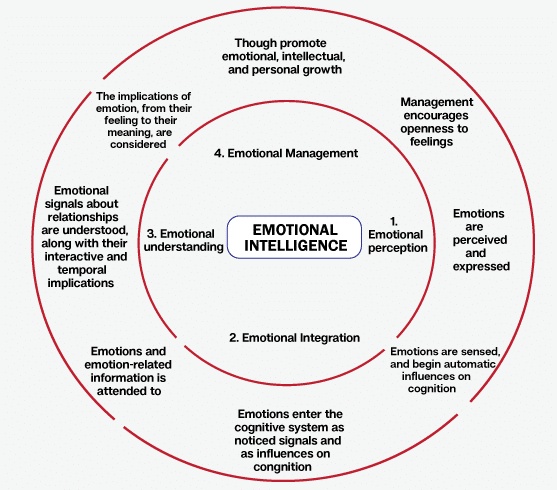
Education has traditionally been focused on academics: mathematics, science, reading, and the like. Still, as interconnectedness and overall complexity continue to mount across the world, EI has increasingly taken center stage in thoughtful considerations related to student preparation for success-in and out of the classroom confines. Emotional intelligence is best described as the “capability to recognize, understand, and manage emotions while empathizing with others.”.
It fills this gap in modern education and provides the linkage between pure academic knowledge and real-life application, thus providing the skills in many areas far beyond traditional learning.
Understanding Emotional Intelligence
The cornerstone of emotional intelligence is self-awareness and empathy. It is composed of five major elements:

Self-awareness: The capacity to recognize and understand your own feelings and the way in which these affect your behavior.
Self-Regulation: manages emotional responses and can remain calm under pressure, adapting to change.
Motivation: emotional energy that drives ambition and persistence.
Empathy – Recognizing and understanding the emotions of others, fostering meaningful connections.
Social skills – Building and maintaining healthy relationships through effective communication and cooperation.
Unlike IQ, which measures only cognitive ability, the focus of EI is on interpersonal and intrapersonal skills. These are crucial in building good relationships, coping with stress, and making decisions responsibly.
Why is Emotional Intelligence Important in Education?
Emotional Intelligence does play a somewhat transformational role within the classroom. It is likely that acquiring such skills, students will be able to excel not only in their academic pursuits but also in their future personal life and career.
Academic Achievement
The emotionally intelligent student is better focused, and anxiety diminishes. Rooted in EI, time management, goal setting, and stressreducing skills have assisted toward betterment in academic performance.
Healthy social interactions
Schools are a social surround, and emotional intelligence can make a student interact with the relations of friendship and teacher. Empathy and communication depend on diminishing conflicts and enhancing collaboration, making it an even more supportive and inclusive environment.
Resilience in Adversity
Life is full of catastrophes, and emotional intelligence arms the students with how to handle them. Self-regulation and self-awareness will help students bounce back from setbacks and teach them perseverance and adaptability.
Preparation for the Workforce
Superimposed on this is that, at the workplace, EI has come to be regarded as an equally important asset as technical skills. Employers look for people who are capable of good communication, team leadership, and who handle stress well. Schools having EI training early enough would, therefore, be preparing their students for the challenges of the contemporary workplace.
Mental Health and Well-Being
In a time when mental health challenges are rising among the young, emotional intelligence makes all the difference. It’s the development of self-awareness that brings awareness to students about the emotional difficulties they’re facing and presents them with an opportunity to amend their attitudes to pursue superior mental health and well-being.
How Schools Can Cultivate Emotional Intelligence Application of emotional intelligence in education does indeed call for deliberate strategies and practices.
Social and Emotional Learning Programs
The whole concept of SEL programs aims at teaching students the skills of emotional intelligence. Students learn about knowing and managing their emotions while building empathies for others through role-playing, mindfulness exercises, and group discussions.
Teacher’s Training
Teachers are on the front lines of emotional intelligence education. By eventually providing this type of training in SEL methods, schools prepare teachers to model EI in the classroom and instruct students effectively.
Creating Supportive Environment
In such an unsafe and non-inclusive school environment, students can freely express themselves without bother. Supportive anti-bullying policies, inclusiveness policies, and open channels of communication provide room for emotional well-being.
Parental Involvement Emotional intelligence does not stop at the school gates, and schools can work with parents to mirror EI in the home through workshops and resources that encourage emotional awareness and empathy in family settings.
Overcoming Obstacles to the Education in Emotional Intelligence
While the benefits of emotional intelligence are apparent, embedding emotional intelligence into education also carries some degree of challenge. Most schools have to grapple with time constraints; their curriculum is already brimming with academic demands, so it’s difficult to insert new modules in between those. These other obstacles include resistance to change, as many educational systems generally foster an atmosphere of measurable outcomes rather than one of holistic development. Besides friends, scarcity of resources or funding can also work against the successful implementation of SEL programs. These very real challenges have not stopped educators, policymakers, and parents from advocating for the growing recognition of the importance of EI. Any such barriers will need to be addressed for the future in terms of ensuring all students shall reap lifelong benefits from emotional intelligence.
The Future of Education: Focus Shifts to Emotional Intelligence

As society develops further, emotional intelligence will also fall increasingly within the purview of education. Interpersonal relationships and emotional problems are issues that students must be properly prepared for, not just academic excellence. Emotional Intelligence arms the students with the realities of life in this fast-changing world. Moreover, by helping students become aware of themselves, develop empathy, and be resilient, schools are raising a generation of citizens who, besides being successful and kind, will also be emotionally stable. The incorporation of EI in education is an investment in a brighter, more equal future wherein, instead of students being prepared to excel, they will lead and inspire. Now is the time to embrace emotional intelligence in education. A transforming force, it bridges the gap between knowledge and humanity, ensuring that today’s learners will be tomorrow’s compassionate leaders.




